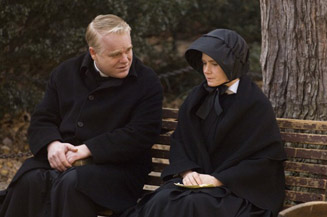Movie Review: Doubt
By Matthew Huntley
December 23, 2008
BoxOfficeProphets.com

Based on Shanley's own play, the film explores a potential molestation case at a New York City Catholic school. The puritanical Sister Aloysius Beauvier (Meryl Streep) suspects Father Flynn (Philip Seymour Hoffman) of making advances on a 12-year-old boy named Donald Miller (Joseph Foster), the only black kid in school. Caught in the middle is the innocent Sister James (Amy Adams), who reports her suspicions of Father Flynn after she sees him with the boy's undershirt and smells wine on Donald's breath when he returns from the rectory.
Sister Beauvier runs an extremely tight ship and has made it her duty to make the children and staff afraid of her. She's incredibly scrupulous and forbids anything remotely modern from entering the school like barrettes, transistor radios and ball point pens. When Sister James tells her about Father Flynn and Donald Miller, Sister Beauvier goes into immediate action and interrogates the priest, urging him to confess or resign. He says she has no proof. "But I have my certainty!" she cries.
That is, she may have her certainty. The most intriguing thing about Doubt is that it raises questions but doesn't necessarily deliver answers. That would normally incite viewer resentment, but a lack of answers is this film's primary theme.
Who really gave Donald Miller the wine in the rectory? Why does Father Flynn have Donald's undershirt? What are Donald and Sister James talking about when he returns from the rectory and why aren't we allowed to see Donald's face in this particular shot? What's the significance of Father Flynn's speech to the boys about keeping their fingernails clean? Is there something sexual about this? Who keeps opening Sister Beauvier's window?
Shanley suggests the constant possibility he'll give us the answers to these questions in one fell swoop. But no, the film is too smart for that. It wants us to ponder.
Another crucial question is whether Sister Beauvier is actually protecting Donald or simply exercising her control over the school. In the film's most powerful sequence, she speaks with Donald's mother (Viola Davis) and tells her Father Flynn may be abusing her son. Because the situation at hand involves a black kid in 1964, Mrs. Miller's reaction is understandable. It's not moral, but it's understandable. We see that Donald's mother is a pragmatist and she reveals her own news to Sister Beauvier that further complicates the situation. I'll not reveal the outcome of their conversation, but it's not something anyone could foresee, even though it's completely plausible.
All throughout Doubt, we suspect Shanley is leading us down a certain path, but the great thing about the film is that nothing is certain. The situations of the plot are hardly black and white, even though the look of the film - dark, cold, and low-key - would suggest otherwise. I think Shanley's intentions are to remind us that so much of what we think about other people is merely speculation and we always take a gamble when we assume we're right about people.
The film's performances are some of the finest of the year, especially the women. Meryl Streep is magnificent as Sister Beauvier and plays the character with complete conviction. Behind her bonnet and makeup, she plays a woman who's deeply angry and lonely. She hasn't much of a heart, but she's stubborn and very strong on the outside, despite the pain she must feel on the inside. It's a juicy role and it would be easy for an actress to reveal herself through overacting, but not Streep. She all but disappears.
Adams' character goes through the greatest transformation and bears the task of questioning her ideals and faith. At first, Sister James is naive and loving but Sister Beauvier's tutelage gradually wears her down. We're witness to Sister James' subtle and drastic personality changes.
Viola Davis, who's only on-screen for about ten minutes, is thoroughly absorbing as Mrs. Miller and lets us feel and empathize with her character's difficult decisions. When she and Sister Beauvier take a walk, there's one particular shot where Davis' eyes, swelled up with tears, shift rapidly from left to right. Davis knows her character is doing something wrong but is also aware the character feels she has to. The emotion behind Davis' words and behavior lets us understand Mrs. Miller's rationale.
Doubt is a film I became enthralled with after I saw it. During the screening, many scenes felt long-winded and the dialogue seemed verbose. But the film's power revealed itself after I had a chance to think about it. It reminded me that so many of us go to the movies just so our expectations can be met. We like to know in advance what we're getting into. Why is that? Isn't it more interesting when a film shakes up our world rather than re-asserts it? Doubt is such a film. It boldly challenges us and lets us know uncertainty can sometimes be just as exciting and compelling as truth.